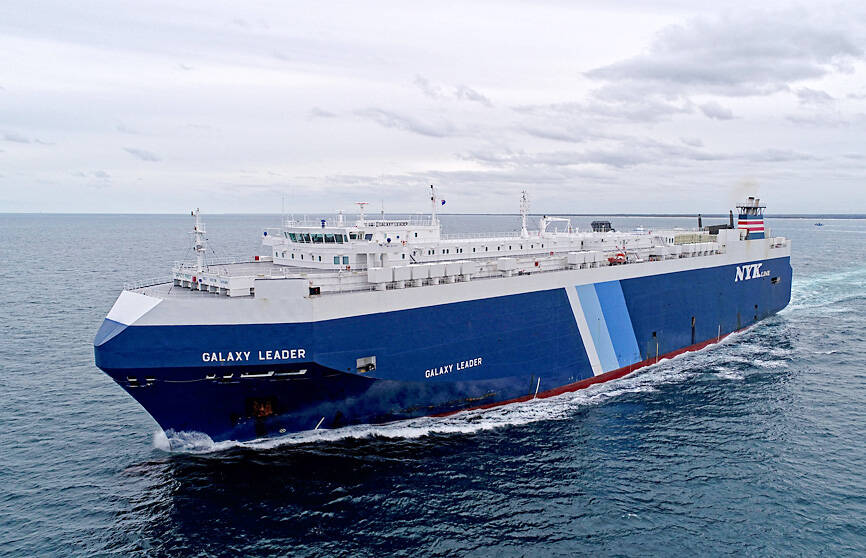Japan yesterday said it was “directly approaching” Yemeni Houthi rebels after they seized a ship owned by an Israeli businessman and operated by a Japanese firm with about 25 crew on board.
Japanese Minister of Foreign Affairs Yoko Kamikawa said Tokyo was “communicating with Israel, and in addition to directly approaching the Houthis, we are also urging Saudi Arabia, Oman, Iran and other countries concerned to strongly urge the Houthis for the early release of the vessel and crew members.”
“Our government will continue to take necessary measures in cooperation with the countries concerned, while taking into account the situation,” she said.

Photo: Owen Foley via Reuters
Houthi military spokesman Yahya Saree wrote on X, formerly Twitter, that the rebels had seized “an Israeli ship” on Sunday in the Red Sea and rerouted it to Yemen’s coast.
The announcement came days after the group threatened to target Israeli vessels in the waterway over Israel’s war with Hamas in the Gaza Strip.
The office of Israeli Prime Minister Benjamin Netanyahu said the vessel was owned by a British company and operated by a Japanese firm.
Nippon Yusen, also known as NYK Line of Japan, said that it operated the Bahamas-flagged Galaxy Leader.
“We were notified from Galaxy Maritime in the UK ... that Galaxy Leader, a car carrier we charter from the company, had been captured” while sailing near the coast of Hodeida.
It said it had set up a task team to gather information and to ensure the safety of the crew.
Maritime security company Ambrey said that the owner was listed as Ray Car Carriers, whose parent company belongs to Abraham “Rami” Ungar, an Israeli businessman.
Houthi “forces will continue to carry out military operations against the Israeli enemy until the aggression against Gaza stops and the ugly crimes ... against our Palestinian brothers in Gaza and the West Bank stop,” Saree said.
Israel said the vehicle transportation ship was traveling between Turkey and India, and that the 25-person crew included Ukrainians, Bulgarians, Filipinos and Mexicans, but no Israelis.

‘GREAT OPPRTUNITY’: The Paraguayan president made the remarks following Donald Trump’s tapping of several figures with deep Latin America expertise for his Cabinet Paraguay President Santiago Pena called US president-elect Donald Trump’s incoming foreign policy team a “dream come true” as his nation stands to become more relevant in the next US administration. “It’s a great opportunity for us to advance very, very fast in the bilateral agenda on trade, security, rule of law and make Paraguay a much closer ally” to the US, Pena said in an interview in Washington ahead of Trump’s inauguration today. “One of the biggest challenges for Paraguay was that image of an island surrounded by land, a country that was isolated and not many people know about it,”

‘DISCRIMINATION’: The US Office of Personnel Management ordered that public DEI-focused Web pages be taken down, while training and contracts were canceled US President Donald Trump’s administration on Tuesday moved to end affirmative action in federal contracting and directed that all federal diversity, equity and inclusion (DEI) staff be put on paid leave and eventually be laid off. The moves follow an executive order Trump signed on his first day ordering a sweeping dismantling of the federal government’s diversity and inclusion programs. Trump has called the programs “discrimination” and called to restore “merit-based” hiring. The executive order on affirmative action revokes an order issued by former US president Lyndon Johnson, and curtails DEI programs by federal contractors and grant recipients. It is using one of the

‘FIGHT TO THE END’: Attacking a court is ‘unprecedented’ in South Korea and those involved would likely face jail time, a South Korean political pundit said Supporters of impeached South Korean President Yoon Suk-yeol yesterday stormed a Seoul court after a judge extended the impeached leader’s detention over his ill-fated attempt to impose martial law. Tens of thousands of people had gathered outside the Seoul Western District Court on Saturday in a show of support for Yoon, who became South Korea’s first sitting head of state to be arrested in a dawn raid last week. After the court extended his detention on Saturday, the president’s supporters smashed windows and doors as they rushed inside the building. Hundreds of police officers charged into the court, arresting dozens and denouncing an

One of Japan’s biggest pop stars and best-known TV hosts, Masahiro Nakai, yesterday announced his retirement over sexual misconduct allegations, reports said, in the latest scandal to rock Japan’s entertainment industry. Nakai’s announcement came after now-defunct boy band empire Johnny & Associates admitted in 2023 that its late founder, Johnny Kitagawa, for decades sexually assaulted teenage boys and young men. Nakai was a member of the now-disbanded SMAP — part of Johnny & Associates’s lucrative stable — that swept the charts in Japan and across Asia during the band’s nearly 30 years of fame. Reports emerged last month that Nakai, 52, who since